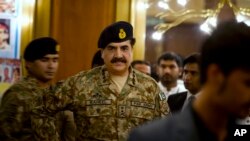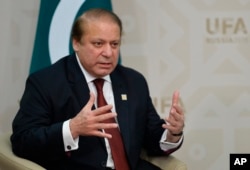Pakistan appears to be defying domestic and international calls for immediate removal of a controversial travel ban on one of its leading journalists, insisting the move is meant to bring “an early closure” to the inquiry into his “concocted” story on a secret national security meeting.
Cyril Almeida, the journalist in question, was informed on Monday that his name had been included in the so-called Exit Control List (ECL). The move bars the journalist from leaving the country, forcing him to abandon a family holiday trip to Dubai.
The punitive measure stemmed from a front-page article his employer, the English-language DAWN newspaper, published on October 6, in which he gave details of an unusually heated exchange between civilian and military leaders during the secret high-level meeting over how to tackle militant groups allegedly operating out of Pakistan.
“Placement of the name of the journalist, Cyril Almeida, on ECL is only meant to bring the inquiry on the inaccurate, concocted and misleading contents of the press report written by him to an early closure,” a senior interior ministry official told VOA Wednesday.
He insisted there is no “check nor restraint” on Almeida’s movements inside Pakistan, though the ECL is primarily meant for barring individuals on the list from undertaking foreign travels.
“Am concerned, possible convinced, more than 24 hours after the travel ban was imposed that government is planning to take further, uglier actions,” Almeida said in a latest message posted on his official Twitter account late on Tuesday.
The controversial article cited anonymous sources describing the face-off, in which the civilian leadership warned that the country faced international isolation unless the military cracks down on anti-India and anti-Afghanistan Islamist groups using Pakistani soil.
Top government officials and the chief of the military spy agency attended the secret meeting, which was chaired by Prime Minister Nawaz Sharif.
The government, however, has since repeatedly called the story “fabricated” and “irresponsible journalism.” On Monday, Sharif said “those responsible should be identified for stern action.”
Local and international media watchdogs, as well as human rights groups, are outraged at the ban on the prominent journalist, who is highly respected for his columns and stories.
In a scathing editorial Wednesday, DAWN maintained the accuracy of its reporting.
“As gatekeeper of information that was “verified, cross-checked and fact-checked,” the editor of this paper bears sole responsibility for the story in question. The government should at once remove Mr. Almeida’s name from the ECL and salvage some of its dignity,” it said.
Another leading English-language newspaper, The Nation, has also written a highly critical editorial in defense of Almeida.
"Since the government would counsel us, the press, on how to do our job, we would like to offer some advice for them, on how to better do theirs. Leave journalists alone. Worry a great deal about Pakistan’s image abroad – some of our actions and inactions as a country are indefensible – everyone knows it, no matter how much we may pretend otherwise,” it said.
In Washington, State Department spokesman John Kirby told reporters the U.S. is aware of the reported restrictions on Almeida. “We’re concerned about any efforts to limit press freedom or the ability of journalists to conduct their very, very important work.
The New York-based Committee to Protect Journalists (CPJ) has also demanded the restrictions on Almeida be swiftly lifted.
"Pakistan can be a dangerous place for journalists, but the nation has a proud tradition of a fiercely independent press," said CPJ Asia Program Coordinator Steven Butler.
”Unhappiness with a press report should never be used as an excuse to restrict the freedom of a journalist,” added Butler.
Amnesty international criticized the “chilling” language used by Prime Minister Sharif’s office and joined the calls for immediate removal of travel restrictions on Almeida.
“It is one thing for the authorities to dispute and contradict a media report. But it is quite another to threaten a journalist under the guise of national security,” the group said.





